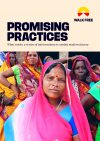Promising Practices
2015: Taking stock of the Sector
Initially created in 2015, the Promising Practices Database collates impact and program evaluations of anti-slavery and counter trafficking interventions in a publicly available dataset. The aim of this work is to enable stakeholders to easily identify “what works” to combat modern slavery.
The initial database housed 179 evaluations covering all forms of modern slavery, including human trafficking, forced labour, and forced marriage. It included interventions such as community empowerment programs, cash transfers, training for police, awareness raising campaigns, case management among other initiatives and activities. The Database has since been updated collating evaluations over the proceeding five years.
Standout findings
The number of anti-slavery evaluations are few, but continue to grow over time
While the evidence base is patchy, programs are being assessed and data is being collected. There are 179 evaluations in the 2015 Database and this number is expected to grow in the next iteration.
Project evaluation should be part of project development
It is important to use a cyclical approach to ensure that project design can build on prior learnings, and that relevant data is being collected during project implementation to support the assessment of impact at the end of the project.
We need to improve the quality of underlying program design
A clear theory of change and clearly articulated relationships between the program objectives and the activities being implemented are fundamental to evaluate the effectiveness and impact of a project.
We need more impact evaluation
Too few evaluations measure the impact on modern slavery. Most evaluations assess the progress of the program (achievement of activities or outputs) or the outcomes of the program (achievement of objectives or overall outcomes) but not how the program impacted modern slavery, such as by decreasing the number of people in slavery, or changing behaviours that allow slavery to occur. To truly understands what works, we need to conduct more impact evaluations either in hotspots of slavery or across a particular type of intervention.
We need to differentiate between types and qualities of evaluations
Evaluations are often opaque — it can be unclear which methodology and data sources were used. This undermines any conclusions made, while a clearer articulation of methods of analysis will allow more transparent conclusions to be drawn.
Promising Practices: Five years of lessons learned
Our Promising Practices Database was updated in 2020 and provides an opportunity to reflect on changes in anti-slavery and counter trafficking programming over the last five years.
Policy papers
Walk Free will release policy papers outlining lessons learned in anti-slavery and counter trafficking programming and evaluations contained within the Promising Practices Database.
Read our policy papers on cash transfers and survivor inclusion.
Contribute to our work
If you are a program designer or funder involved in conducting evaluations on modern slavery programs, you can contribute to our work.
If you host evaluations on your website, ensure navigation is clear and search engine optimisation allows for appearance in search results or format your evaluations so they can be hosted on search engines such as Google Scholar. Alternatively, you can submit your evaluation directly to our team.
If you have used the Promising Practices Database to inform your work, we would also love to hear from you. Please reach out to us via our email.


